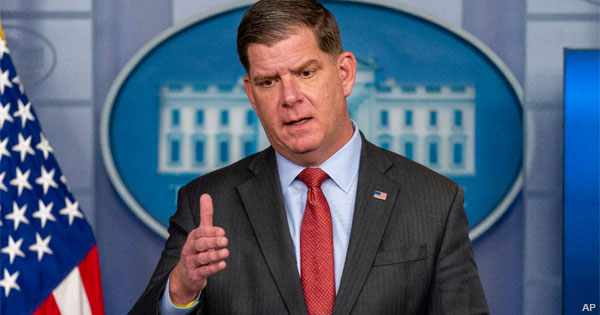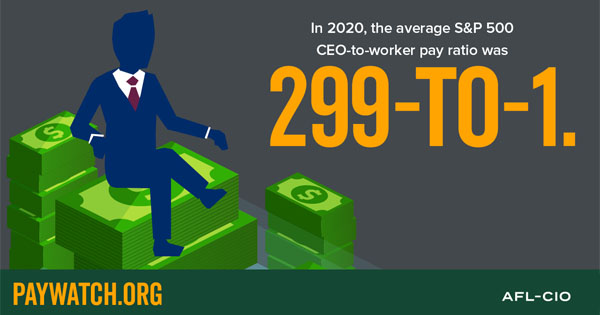NEWS ROUNDUP
‘Summer of climate change’ | Runaway CEO pay | Pension rescues begin
Thursday, July 15, 2021
THIS WASHINGTON
► From the Wenatchee World — Level 3 evacuations in Warner Canyon as fire activity picks up overnight — Homes in Warner Canyon were issued Level 3 evacuation — leave now — notices around 9 p.m. Wednesday, according to Chelan County officials. Fire activity in the area picked up rapidly late Wednesday night into the early hours of Thursday morning, with flames advancing further down the foothills toward homes below.
► From the Spokesman-Review — Inslee declares drought emergency for vast majority of Washington, says this is ‘summer of climate change’ — The declaration, which excludes only the Seattle, Tacoma and Everett metro regions, means water supply is projected to be below 75% of average in almost all of Washington.
► From the Wenatchee World — Weather conditions will make battling wildfires more challenging
► From the Tri-City Herald — Franklin County has 2nd highest COVID rate in 3 states. Benton County is 5th. — Benton, Franklin and Walla Walla counties are leading the state of Washington and most of Idaho and Oregon in recent new cases of COVID-19, according to new data. Walla Walla County has the highest rate in the three states. In Walla Walla County to 52% of people old enough to be vaccinated are fully vaccinated. That drops to 46% in Benton County and 39% in Franklin County.
► From the Daily News — State hits 70% vaccination goal, county rates vary
LOCAL
 ► From Seedcast — Picking berries and building power with Indigenous farm workers (podcast) — A community of Indigenous Mixteco and Triqui farm workers were displaced from their homelands, and are now organizing to challenge the exploitive work conditions they face in the United States, all while finding ways to preserve their language, culture, and relationship to the Earth. Marciano Sanchez (Mixteco) and his father Lorenzo Sanchez Basurto (Mixteco) tell host Jessica Ramirez about their family’s path from Southern Mexico to the berry fields of Washington state. We also hear from Edgar Franks, political director at Familias Unidas por la Justicia, about the union’s fight for fair compensation and better working conditions.
► From Seedcast — Picking berries and building power with Indigenous farm workers (podcast) — A community of Indigenous Mixteco and Triqui farm workers were displaced from their homelands, and are now organizing to challenge the exploitive work conditions they face in the United States, all while finding ways to preserve their language, culture, and relationship to the Earth. Marciano Sanchez (Mixteco) and his father Lorenzo Sanchez Basurto (Mixteco) tell host Jessica Ramirez about their family’s path from Southern Mexico to the berry fields of Washington state. We also hear from Edgar Franks, political director at Familias Unidas por la Justicia, about the union’s fight for fair compensation and better working conditions.
► From the Daily World — Grays Harbor Transit goes fare-free through 2022
► From the Columbian — Evergreen schools superintendent’s new salary: $305,884
EXECUTIVE PAYWATCH
► From the AFL-CIO — 8 facts from the 2021 Executive Paywatch you need to know
- In 2020, CEOs of S&P 500 companies received, on average, $15.5 million in total compensation.
- The average S&P 500 company CEO-to-worker pay ratio was 299-to-1.
- The average S&P 500 CEO’s pay grew $712,720 last year.
- Over the past decade, the average S&P 500 CEO’s pay has increased by $2.6 million.
- The average pay ratio in “right to work” states was 173-to-1. In free bargaining states, it was 133-to-1.
- The worst industry, in terms of CEO-to-worker pay is the consumer discretionary sector (including companies like Amazon.com), where the ratio was 741-to-1.
- Other industries with the largest discrepancies between CEO and worker pay were: consumer staples (383-to-1), communication services (334-to-1), information technology (315-to-1) and health care (253-to-1).
- Over the past decade, the average CEO pay at S&P 500 companies increased by an average of $260,000 a year. Meanwhile the average wage for production and nonsupervisory workers grew an average of only $957 per year in that same time.
 ► From Reuters — U.S. CEO-to-worker pay ratio rose to 299:1 last year — The average S&P 500 chief executive made $15.5 million last year, 299 times the pay of the median worker and a higher ratio than in 2019, the top American labor union said on Wednesday, as the COVID-19 pandemic drove layoffs while executive compensation grew. The ratio was 264-to-1 in 2019. “Working people bore the brunt of COVID-19 and its impact on the U.S. economy,” said Liz Shuler, Secretary-Treasurer of the AFL-CIO.
► From Reuters — U.S. CEO-to-worker pay ratio rose to 299:1 last year — The average S&P 500 chief executive made $15.5 million last year, 299 times the pay of the median worker and a higher ratio than in 2019, the top American labor union said on Wednesday, as the COVID-19 pandemic drove layoffs while executive compensation grew. The ratio was 264-to-1 in 2019. “Working people bore the brunt of COVID-19 and its impact on the U.S. economy,” said Liz Shuler, Secretary-Treasurer of the AFL-CIO.
► From the People’s World — AFL-CIO: Paywatch data shows need for PRO Act — The yawning gap—and in many cases, a chasm—between rich company CEOs and the rest of us, especially their workers, is yet another reason Congress should pass the Protect the Right to Organize (PRO) Act, AFL-CIO Secretary-Treasurer Liz Shuler says. And the labor federation will take that message, among others in favor of the legislation, on the road in a week-long on-the-ground grass-roots campaign from July 17-23.
The Stand — Join WSLC at PRO Act Appreciation Rallies — Union supporters will gather to thank Sen. Maria Cantwell on Saturday in Tacoma, and Sen. Patty Murray on Monday in Seattle — and urge both to keep fighting to pass the PRO Act.
THAT WASHINGTON
► From the AP — Money in the bank: Child tax credit dollars head to parents — President Biden has held out the new monthly payments, which will average $423 per family, as the key to halving child poverty rates. But he is also setting up a broader philosophical battle about the role of government and the responsibilities of parents. Democrats see this as a landmark program along the same lines as Social Security, saying it will lead to better outcomes in adulthood that will help economic growth. But many Republicans warn that the payments will discourage parents from working and ultimately feed into long-term poverty.
► From the Washington Post — Monthly child tax credit payments start hitting bank accounts this week. Here’s what you need to know if you’re eligible.

► From the NW Labor Press — U.S. government launches pension rescue — The U.S. Labor Department on July 9 unveiled its rules for a new $94 billion program to rescue failing union pension plans. The program was one small part of the American Rescue Plan Act which passed in March, and it’s expected to help more than 3 million union members and their spouses. The rescue is Congress’ biggest-yet response to a crisis afflicting about one in seven multi-employer pension plans. All told, the Pension Benefit Guaranty Corporation (PBGC) estimates over 200 pension plans will be eligible for the assistance, including over 100 plans that would otherwise have become insolvent during the next 15 years.
► From Politico — Pigs fly: McConnell weighs giving Biden a bipartisan win — The self-appointed “Grim Reaper” of the Senate, a minority leader who said just two months ago that “100% of my focus is on standing up to this administration,” has been remarkably circumspect about the Senate’s bipartisan infrastructure deal. He’s privately telling his members to separate that effort from Democrats’ party-line $3.5 trillion spending plan and publicly observed there’s a “decent” chance for its success.
 ► From the LA Times — The firing of a wretched Trump appointee opens the door to expanding Social Security (by Michael Hiltzik) — Tens of thousands of Social Security Administration employees began work Monday with the sense that a new day was dawning for themselves and the program’s more than 64 million beneficiaries: A Trump-appointed commissioner who had undermined its mission while picking fights with its workforce had been fired after two years in office. Biden’s firing of Andrew Saul removes one of the chief impediments to progress in making this all-important social program even better for workers, their dependents, and those with disabilities by increasing and expanding benefits and demolishing administrative obstacles to benefits.
► From the LA Times — The firing of a wretched Trump appointee opens the door to expanding Social Security (by Michael Hiltzik) — Tens of thousands of Social Security Administration employees began work Monday with the sense that a new day was dawning for themselves and the program’s more than 64 million beneficiaries: A Trump-appointed commissioner who had undermined its mission while picking fights with its workforce had been fired after two years in office. Biden’s firing of Andrew Saul removes one of the chief impediments to progress in making this all-important social program even better for workers, their dependents, and those with disabilities by increasing and expanding benefits and demolishing administrative obstacles to benefits.
► From HuffPost — Unions gave money to GOP lawmakers who voted to overturn the election — Corporate political giving has drawn a lot of attention since Jan. 6. While unions tend to steer far more money to Democrats, some spread their contributions around to both political parties — including to members of Congress who didn’t want to certify Joe Biden’s victory in the Electoral College. The Air Line Pilots Association, for example, contributed to the reelection efforts of eight GOP election objectors.
► From the Washington Post — As IRS audits waned, big businesses racked up unapproved tax breaks — Corporations have claimed more “uncertain” tax breaks in recent years, as IRS budget cuts have weakened the government’s ability to challenge them.
► From Roll Call — Federal workers to gain access to ESG in retirement portfolios — Millions of federal workers will soon have the option to direct their retirement savings to funds that incorporate environmental, social and governance factors in their investment decisions.
► From the Washington Post — Justice Breyer has not decided when he will retire
NATIONAL
► From HuffPost — People working a minimum wage job can’t afford rent anywhere in the U.S. –At local minimum wage rates, a worker would have to put in 79 hours a week, nearly two full-time jobs, to afford a modest one-bedroom rental, a report finds.
EDITOR’S NOTE — Can’t afford rent? Get more information about how you can join together with co-workers and negotiate a fair return for your hard work. Or go ahead and contact a union organizer today!

► From US News & World Report — Largest nurses union calls on CDC to reinstate mask recommendation — In a letter Monday to CDC Director Rochelle Walensky, the National Nurses Union urged the health agency “once again to update the … COVID-19 guidance” calling on the CDC to “reinstate the recommendation for everyone to wear masks when in public or in physical proximity to others outside their own household.”
► From The Hill — GOP vaccine resistance poses growing challenge in pandemic fight — Growing Republican resistance to COVID-19 vaccines is raising alarms among public health experts and creating a major challenge as the U.S. tries to move past a pandemic that has lasted almost a year and a half.
► From ABC News — With taxpayers’ help, Delta posts $652 million profit in 2Q — Delta Air Lines is reporting profits of $652 million for the second quarter thanks to an increase in leisure travel and $1.5 billion in federal pandemic relief.
► From WBUR — Massachusetts public employees press right-to-strike legislation
The Stand posts links to Washington state and national news of interest every weekday morning by 10 a.m.







